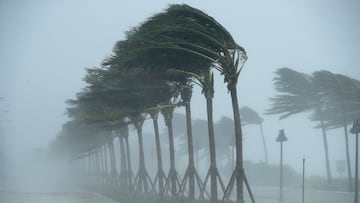2025 hurricane season forecasts are here: Will there be more storms than last year, and how strong?
The 2025 hurricane season officially begins on June 1 and ends November 30. The first forecasts for what’s in store have already been published.

Last year’s hurricane season was one of the most destructive in recent years and started with the formation of Hurricane Beryl, the earliest Category 5 Atlantic hurricane since official statistics began, in late June.
The 2024 season wasn’t particularly active compared to other years, with 18 named storms and 11 hurricanes - five of them classified as major hurricanes (Category 3 and above).
Did the winter 2024-25 La Niña precipitation pattern perform as predicted? To find out, we compared observed conditions to two ENSO-monitoring indices. See how we did in our newest ENSO blog post! https://t.co/BfaoMwBY2b pic.twitter.com/ISbk9kwLgI
— NOAA Climate.gov (@NOAAClimate) March 27, 2025
Above-average activity expected in the 2025 hurricane season
So what is this year’s hurricane outlook? The first estimates and forecasts have started to come in. Colorado State University issued theirs this week in which they predict “above-normal activity” with a 51% chance of at least one major hurricane landfall on the entire US coastline (the average is 43%). For the East Coast and Florida the possibility is 26% (average: 21%), and for the Gulf Coast from the Florida Panhandle, 33% (average: 27%).
Colorado State University‘s forecast explains that while current sea surface temperatures across the eastern and central Atlantic are warmer than normal, they are not as warm as they were at the same time last year.
Learn more about other factors contributing to this prediction, hurricane landfalling probability, and where you can find updates: https://t.co/vjSR3fkPMR
— Colorado State University (@ColoradoStateU) April 3, 2025
Water temperatures down on last year
Warmer waters in the Gulf Coast are associated with La Niña events, providing a more conducive dynamic and thermodynamic environment for hurricane formation and intensification. As storms develop, they become much more powerful when traveling over these warmer waters.
La Niña conditions tend to lead to more tornadoes in the US South and Southeast. But with La Niña fading, there is considerable uncertainty as to what the phase of El Niño-Southern Oscillation (ENSO) will be this summer and fall.
The National Oceanic and Atmospheric Administration’s forecast is due out next month but their forecasts are usually similar to the Colorado State University‘s. The 2025 hurricane season officially begins on June 1 and ends November 30. We’ll get a clearer picture in the coming weeks but as this first forecast points out, “it only takes one hurricane making landfall to make it an active season”.
Get your game on! Whether you’re into NFL touchdowns, NBA buzzer-beaters, world-class soccer goals, or MLB home runs, our app has it all.
Dive into live coverage, expert insights, breaking news, exclusive videos, and more – plus, stay updated on the latest in current affairs and entertainment. Download now for all-access coverage, right at your fingertips – anytime, anywhere.
Complete your personal details to comment
Your opinion will be published with first and last names